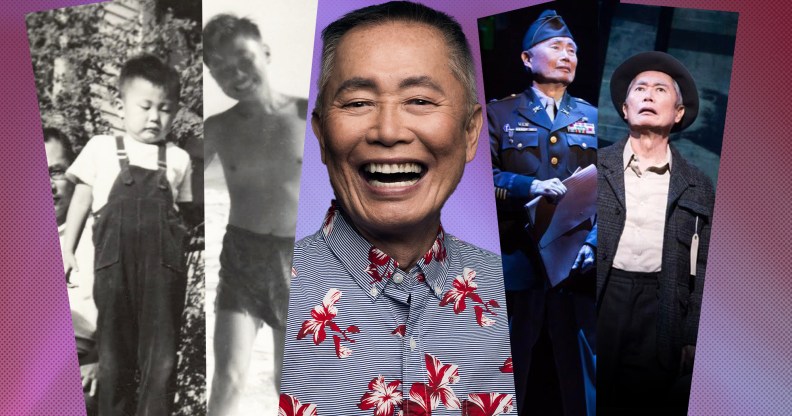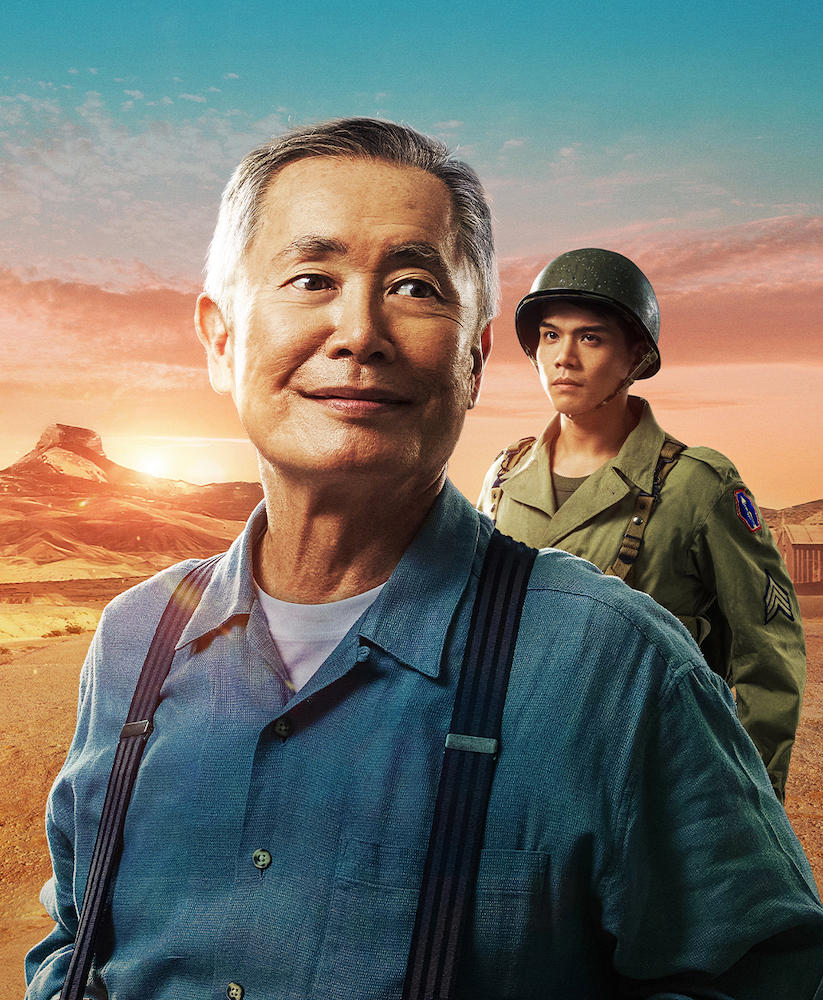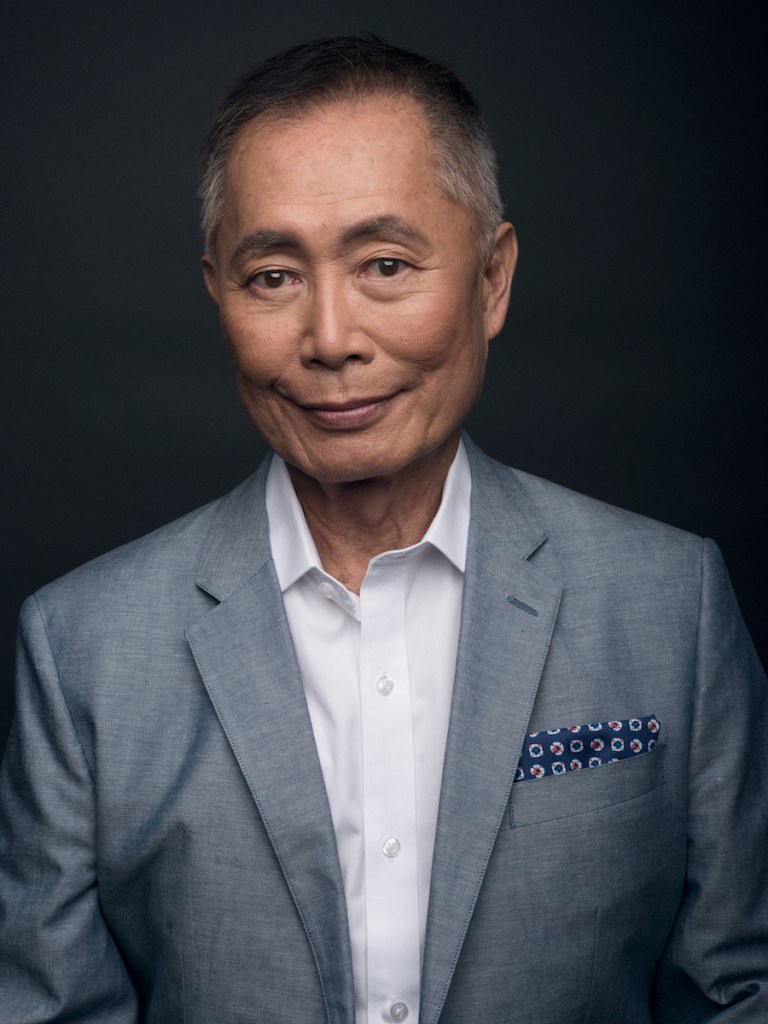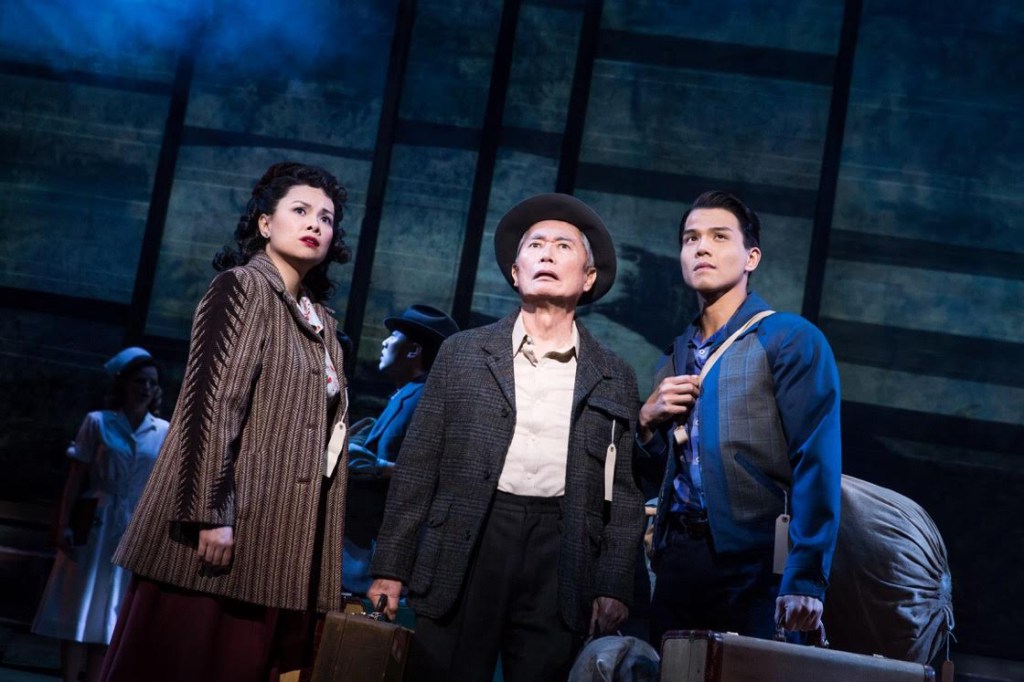George Takei on living in a prison camp, coming out and right-wing plot to ‘divide and conquer’

George Takei is bringing his show Allegiance to London. (George Takei/Luke Fontana/Matthew Murphy)
George Takei is bringing his show Allegiance to London. (George Takei/Luke Fontana/Matthew Murphy)
In 1942, George Takei and his family were placed behind the barbed-wire enclosures of internment camps along with 120,000 other Japanese-Americans.
The California-born actor spent years of his childhood at Camp Rohwer in Arkansas and at Camp Tule Lake in northern California. At the end of the war, Takei’s family returned to Los Angeles.
“My parents had their bank accounts frozen, which meant they couldn’t pay the mortgage and their business was destroyed,” he remembers.
“Then we were put in a prison camp guarded by soldiers with guns.”

Takei has been reflecting on his childhood a lot lately – he’s bringing his semi-autobiographical musical, Allegiance, to London’s West End.
The show follows the Kimura family in the years following the attack on Pearl Harbor, as they are forced to leave their farm in Salinas, California and are sent to the Heart Mountain Relocation Center in the rural plains of Wyoming.
The characters are fictional, but their story is informed by the real experiences of Takei and his parents. This is a chapter in American history, but also his own life story, that too few people know about.
“I was a young child then,” he says. “So it was only as a teenager in conversations with my father that I came to understand what I’d lived through.”

Takei has been politically active all his life. He was an alternate delegate from California to the 1972 Democratic National Convention and, the following year, he ran for a seat on the Los Angeles City Council, finishing second of five candidates.
In 1980, Takei began a campaign for California state assemblyman, dropping out to focus on acting and activism. He is a supporter of the Democratic Party and has been a vocal opponent of right-wing politicians who target minorities.
When he publicly came out as gay in 2005, it was in response to then-California governor Arnold Schwarzenegger’s veto of same-sex marriage legislation.
I wonder why Takei thinks it’s important to bring Allegiance to the stage right now, in a polarised political environment where extreme, conservative voices are increasingly emboldened?
“The same kinds of things are happening today, not only in America, but all over the world,” he says.
“Governments act on lies, particularly if there is a charismatic or powerful or authoritarian person that can sway a lot of people on the basis of a lie.”
He tells me how president Trump (who he refers to as “the worst president in American history”) demonised Muslims.
“I won’t say his name, but you know who he is,” he says. “The first act he did was to try to pass the Muslim travel ban. Muslims are not terrorists, but that lie became what he acted on.”
For Takei, the story of what happened to his family – and the lies that were spread to justify the racist imprisonment of Japanese people in America – is eerily familiar in today’s world events.
“Even the Ukrainian war, that is a lie,” he says. “Putin tries to say that a whole chunk of the planet is a part of Russia, and then, with no provocation, he invades and says he is being invaded? Lies are what cause the biggest tragedies and prove that the human animal is still a beast.”

A few days before our interview, a gunman had shot dead five people at Club Q in Colorado Springs, against a backdrop of media misinformation about LGBTQ+ people, particularly trans people.
In the aftermath of the attack, far-right influencers continued to amplify inflammatory anti-gay and anti-trans rhetoric on social media. In these difficult times, Takei implores LGBTQ+ people not to become disillusioned.
“Right now, we can react,” he says, again referring to how people like his parents had that option taken away from them. “We have the opportunity to resist.”
“People of prejudice or ignorance or insecurity will try to divide people and intimidate people, but to let them divide us would be a dangerous thing to do.”
George Takei
Part of this right-wing, anti-trans rhetoric has been an attempt to turn LGB people against trans people, with established groups like the Heritage Foundation working with new, “gender-critical” groups like the LGB Alliance.
“They always try to divide and conquer, that’s the essence of what’s going on,” Takei says of this. “People of prejudice or ignorance or insecurity will try to divide people and intimidate people, but to let them divide us would be a dangerous thing to do.”
Before he came out in 2005, Takei was an activist on other issues, but kept quiet on LGBTQ+ issues.
“There is a heavy price to be paid for that and one of the heaviest was a sense of guilt,” he says.
He feels “deeply indebted” to the “early pioneers” who came out before him.
“It was a mean society and they were advocating for me, which saddled me with a heavy sense of guilt,” he says. “I’m deeply indebted to those early pioneers. I came out when I was 68, and I had been together with Brad for many years.”

Hiding his sexuality was part of why abandoned his political ambitions. In 1973, when first ran, he was closeted and constantly worried that he would be outed by opponents. During his acting career he had snuck into gay bars, and he began to worry that someone might be ready to expose him.
“Politics was the most challenging activity that I engaged in and ‘opposition research’ was what frightened me the most, because it could be devastating politically and psychologically,” he says.
During this time, he was “always” on guard. “I was paranoid,” he says. “I would wonder whether the cute guy volunteering was actually a volunteer, or whether he was there as a decoy!”.
Since coming out, Takei has transformed himself into a social media phenomenon. He’s earned a new generation of fans with his posts, which gravitate between righteous fury and humour, and rallying for LGBTQ+ rights.
Being so visible is something of a full-circle moment. Ironically, Star Trek, in which he played Mr Sulu, has always had a huge queer following, despite the fact that Takei was closeted until years after his starring role.
“From the first season, LGBTQ+ people were writing fan letters to us,” he remembers. “It gave them comfort”.
“Star Trek was all about the richness of diversity and LGBTQ+ people understood that philosophy.”

Despite the fact that it aired in more conservative times, Takei explains that Star Trek “metaphorically” dealt with a lot of issues, like civil rights, the war in Vietnam and peace in the United States. There were aliens who fell in love despite being different “races” and, in 1968, Captain Kirk (William Shatner) and Black actress Uhura (Nichelle Nichols) kissed. It was one of the first interracial kisses on US TV.
“In my generation, we never dealt with the gay issue on Star Trek, but there have been LGBTQ+ characters in the years since,” Takei explains, before telling me he raised this issue with show creator Gene Roddenberry at the time.
Roddenberry said that, while he would love to explore same-sex romances through the guise of creatures in the Star Trek universe, he feared backlash. The interracial kiss had caused fierce controversy in the American South, with some states refusing to broadcast the episode. “For that episode, ratings went way down, so he feared cancellation if he rocked the boat too much,” he says. “The gay issue was something that the television medium didn’t allow us to deal with in the 1960s.”
“The gay issue was something that the television medium didn’t allow us to deal with in the 1960s.”
George Takei
At the age of 85, more than fifty years since he first became a global star, Takei could hardly be described as slowing down. After all, few actors have made their London stage debut as an octogenarian. How does he stay motivated?
“I love what I’m doing and I feel blessed that I have health and support and the opportunity to do it,” he says.
“I love acting, I love connecting with people, I love the ovation at the end. There are all these corny but very human things that are compelling. And at the same time my mission is to raise awareness and push back against the ignorance that hurts people.”
George Takei stars in Allegiance at London’s Charing Cross Theatre from 7 January to 8 April, 2023 and tickets are available from londontheatredirect.com.
This article contains affiliate links, PinkNews may earn revenue if you click through and purchase products through the links.

